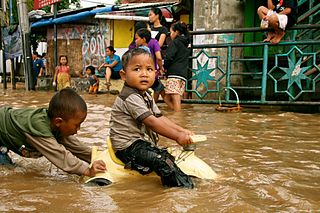 Kate Lamb, Freelance journalist
Kate Lamb, Freelance journalist
Climate change is perhaps the most significant intergenerational challenge facing the world today. It requires us to think about the legacy we will leave our children and future generations.
—Climate Change: Children's Challenge (2013, p. 9)
While the climate world slices and dices the first of a series of reports from the Intergovernmental Panel on Climate Change (IPCC), the United Nations Children's Fund (UNICEF) in the UK just released a report—Climate Change: Children's Challenge—designed to prompt action by the UK government. The UK UNICEF report points out the obvious: that children will bear the brunt of climate change.
Youth between 11 and 16 are worried about how their future will be affected by climate change, with nearly two thirds also voicing concern about how children and families in the developing nations will fare, according to the report.
A related poll of youth voters in the United States found similar concerns, with two thirds indicating climate change is a problem to address, 80% favoring President Obama's Climate Action Plan, and 68% saying they would be less likely to vote for someone who denies climate change.
The UK UNICEF report, which incorporates the testimonials of youth from around the world, paints a grim picture of how vulnerable children and youth are to threats that climate change multiplies: food security, water, health, and disasters. The World Health Organization has found that currently 88% of the global burden of climate change related disease occurs in children under the age of five. Today there are 1.6 billion people living in nations with absolute water scarcity, and by 2025 that figure will probably rise to 2.8 billion.
Education is also vulnerable to climate change, but also invaluable in addressing its causes and effects, as the report explains:
While climate change has the potential to cause serious disruption to children's schooling, education is also a vital tool in tackling climate change. Climate change education is an important adaptation measure, particularly in vulnerable developing countries, teaching children the skills they need to cope with a changing climate; for example, how to deal with the increasing onset of natural hazards, such as floods and cyclones.
The UK UNICEF report suggests how climate education in the developed nations will help with fostering low carbon solutions and resource conservation. It offers a series of recommendations that are in effect no-regrets strategies to address the practical and moral challenges:
- Tackling emissions and further climate change
- Adaptation and equipping communities
- Financing of climate strategies
- Participation of children and young people in climate change policy
- Agreement on a new global climate change treaty
- Importance of climate change action in post-2015 processes
Of these, only one directly involves youth, and the report is vague on how that will be accomplished. But Allison Anderson of the Brookings Institute has previously suggested in her paper Combating Climate Change Through Quality Education that through youth engagement and empowerment, young people can gain the knowledge and the knowhow to be able to help themselves and their communities sustain themselves in the turbulent times that already exist.
In some respects, the IPCC reports, important as they are, are a distraction. Almost all climate scientists and nations agree that climate change is occurring due to human activities. But not nearly enough is being done to educate and prepare young people for the change of climate already underway.
